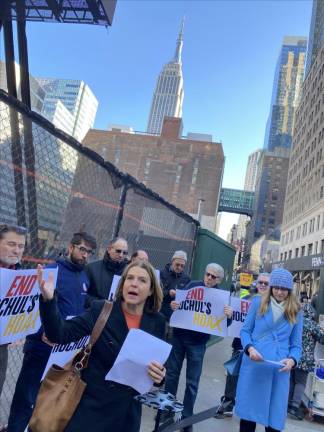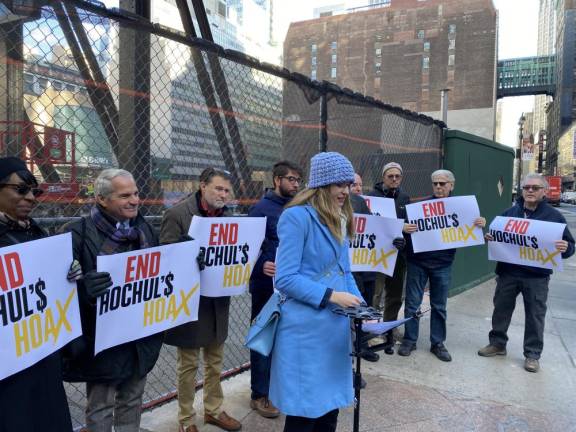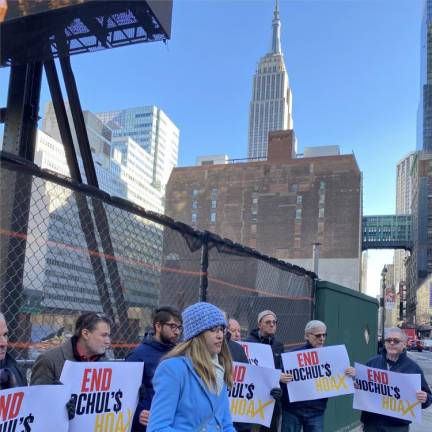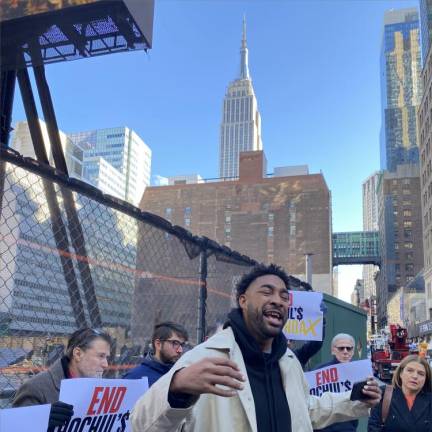Local Activists Push Hochul for New Plan on Lot Where Hotel Pennsylvania Was Demolished
Vornado tore down the historic Hotel Pennsylvania earlier this year even as it was abandoning its plan to construct a ring of office towers around Penn Station/Madison Square Garden. Now the vacant lot where the hotel once stood is drawing heat from local activists who want Governor Hochul to devise a new plan for the site that could include housing.




It isn’t quite the largest vacant property in Manhattan, but it is certainly the most centrally located. For a hundred years it was the site of the legendary Hotel Pennsylvania, once the largest hotel in the world.
Then, swiftly, the owner, Vornado Realty Trust, yanked the massive hotel down this year, leaving the most jarring vacancy in the Manhattan sky since the twin towers fell.
Vornado has said it wants the site to build a supertall office tower, virtually as tall as the Empire State Building, although when the economics will be right for more offices is unclear.
So as 2023 staggers to its end, various community organizations are agitating both to find a productive use for the vast lot in the short run and to build housing rather than more office towers in the long run.
“The neighborhood sits in limbo while Vornado waits for better economic conditions that are unlikely to materialize anytime soon (if ever),” said a newly formed coalition of community groups as they rallied at the site this week.
Their efforts collide head on with one of the most tangled real estate undertakings in city history. The hotel site is part of what the state calls its General Project Plan, a massive but now moribund effort to redevelop the neighborhood around Penn Station and Madison Square Garden by building ten new office buildings.
Former Governor Andrew Cuomo originally promoted this venture by saying it would generate revenue to rebuild the station. Governor Kathy Hochul earlier this year said she was “decoupling” the rebuilding of Penn Station from the development efforts, which in any case were stalled by economic conditions which Vornado, the largest property holder, told its investors have taken new office construction off the table, for the moment.
“New York State and City should not be demolishing viable historic buildings to create massive vacant lots that blight our communities for years, waiting until it’s financially viable to build luxury office towers,” said a member of the new community coalition, George Calderaro, of the 29th Street Neighborhood Association.
Members of the coalition, calling their effort “End Hochul’s Hoax,” gathered at the corner of the Hotel site, at 32d Street and Seventh Avenue, to demand that Governor Hochul scuttle the GPP altogether and, more specifically, that Vornado consider building housing where the Hotel Pennsylvania had been, rather than the massive office tower it originally planned.
A similar call was made by the land use committee of Community Board Five, meeting a day after the community coalition event.
“This vacant site is very problematic,” said Layla Law-Gisiko, chair of the land use committee. “Vacant sites are really the cause for blight.”
Use of the word blight was pointed, since the state has used a claim that the Penn neighborhood is “blighted” to justify the GPP redevelopment plan, which uses the state’s condemnation power to override local zoning and make way for the supertall office towers.
She noted that the GPP calls for virtually no new housing, despite the city’s housing crisis, while the overridden city zoning would allow housing on the hotel site and other sites in the GPP zone.
She said the state could abandon the GPP and come up with a plan just for the Hotel Pennsylvania site.
But despite the ups and downs of the economy, and of the GPP, Vornado does not appear to have given up on a supertall office tower on the site.
For “Vornado’s overall plans for Hotel Penn site,” a company spokesman referred a reporter to the company’s plan for the Penn Station district, where it is the largest property holder.
The final 44 pages of the report are devoted to a description of a spectacular 1,200 foot tall office tower with terraces, entertainment spaces and amenities for tenants.
Several of the architect’s renderings dramatize the scale of the building by showing tenants on high floors looking straight across at the Empire State Building, which including its mast is 1400 feet tall.
While office use has plummeted since the pandemic, real estate experts point out that so-called class A office space is still in demand, while older buildings are suffering.
Vornado officials said on their most recent call with stock analysts that the rental environment in Manhattan was improving for their current properties, which include the office tower above Penn Station, immediately across Seventh Avenue from the Hotel Pennsylvania site.
“Our buildings are pretty much back to normal Monday through Thursday,” the chairman of Vornado, Steven Roth, told the analysts.
But he said financial conditions remain too tight to start new buildings, although he forecast that the value of class A offices would rise as demand returns.
In the meantime, Vornado officials said they were studying ideas for putting the vacant lot to use.
“We’re pursuing a few ideas,” Michael Franco, the President and CFO of Vornado, told the analysts. “Too early to tell you which one or ones we’re going to settle on. But you’re exactly right. It’s a great site in the center of the city. And whether it’s fashion shows or other temporary uses, we think there will be opportunities to generate some cash flow until the site is ready for development.”
The site has also been mentioned as the solution to a related challenge: Where Madison Square Garden could be moved if its owner, James Dolan, acceded to the arguments that a rebuilt Penn Station would be far better without the Garden on top of it.
Community Board Five is among the groups that have called for moving the Garden. Law-Gisiko noted, however, that it was possible to advocate for this as an ideal solution, while still also favoring housing as a fall back on the site rather than a new super tall office tower.
A spokesman for Governor Hochul issued a statement affirming the Governor’s support for the GPP. “The General Project Plan realizes Governor Hochul’s vision for a live-work-play neighborhood in the heart of New York City,” the statement said.
Creating multi-use neighborhoods for living, working and playing in the core of Manhattan, instead of vast office parks abandoned at night, was a major recommendation of a joint task force appointed by the governor and Mayor Adams to identify policies that would encourage the city’s recovery from the pandemic. That report was issued well after the GPP was designed under Governor Cuomo.
A state official noted that the state can’t order private developers to build housing on private land. The GPP includes an option within the GPP, although not on the Hotel Pennsylvania site, for 1800 units of housing, an amount the community critics say is far too small when measured against the need.
The Governor did announce last September a request for proposals to convert the state-owned women’s prison in West Chelsea to supportive housing and mental health facilities.